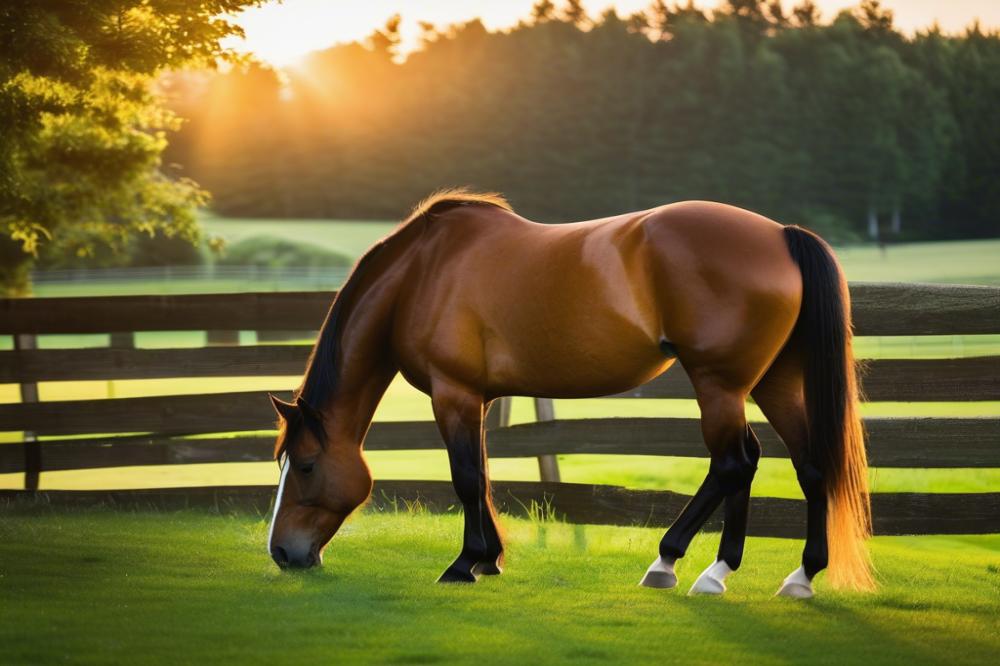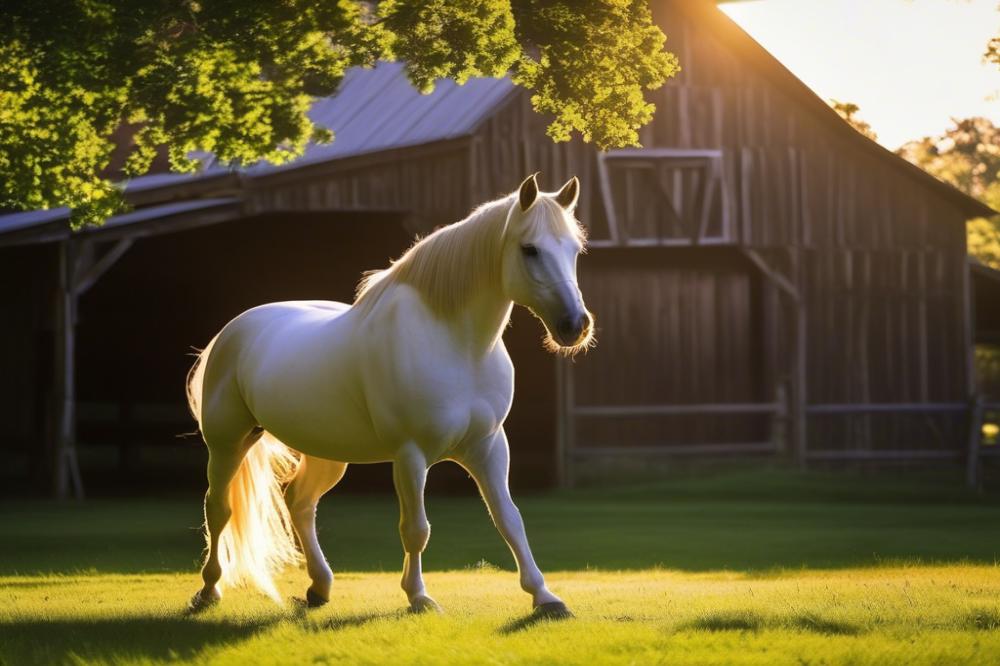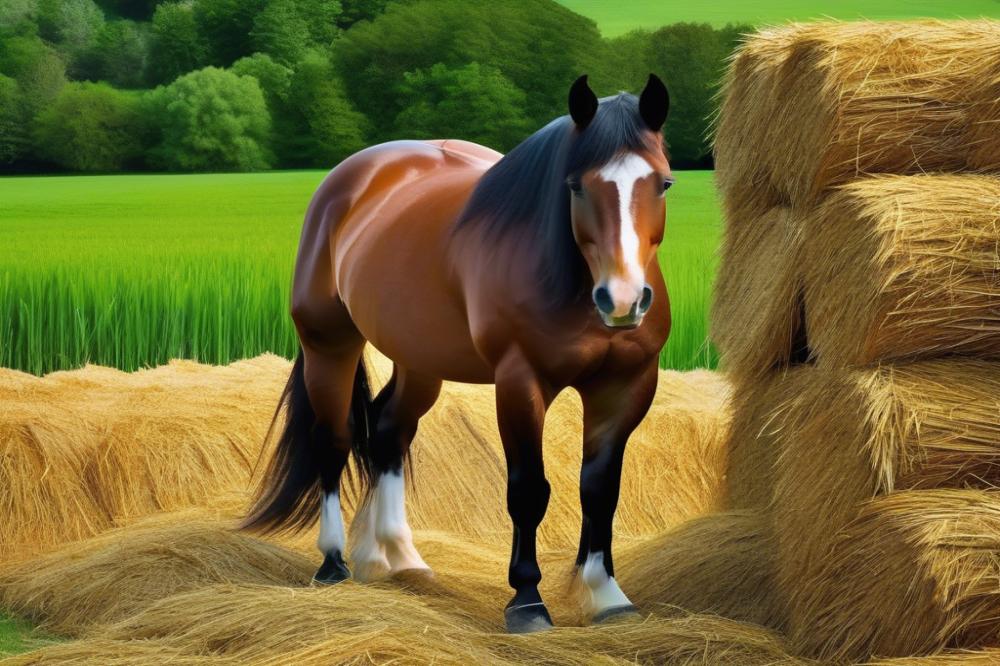Introduction
Proper nutrition plays a critical role in a horse’s overall health and vitality. Every horse requires a balanced diet to thrive. This balance is essential for their growth, performance, and longevity. Nutritional needs can vary based on age, activity level, and specific health conditions.
The Equine Diet primarily consists of forage, grains, and supplements. Forage forms the basis of their nutrition, providing essential fiber. Hay or pasture should always be available, as horses need to graze throughout the day. Grains can serve as a supplement to increase energy levels, especially for working horses. Alongside these, vitamins and minerals are vital in supporting various bodily functions.
Understanding the dietary needs can help owners make informed decisions. Nutritional deficiencies can lead to health issues such as weight loss and poor coat condition. Correct nutrition contributes to a horse’s well-being and performance, making it a top priority for every owner. Comprehensive knowledge about Horse Nutrition allows individuals to provide the best care possible.
Understanding Horse Nutrition

grass forage plays a vital role in a horse’s diet. Horses are natural grazers, and grazing fulfills many of their dietary needs. This type of forage is rich in fiber, which aids in digestion. Fiber also helps keep the horse’s digestive system functioning smoothly.
Hay quality is another critical factor to consider. The kind of hay you choose can impact a horse’s overall health. Good hay should be bright in color, free from mold, and soft to the touch. Various types of hay exist, such as timothy, alfalfa, and orchard grass. Each has its own nutritional profile, making it important to select the right one based on your horse’s specific needs.
Understanding key nutrients is essential for any horse owner. Carbohydrates provide energy and should be a primary part of their diet. Simple carbs are quickly absorbed, while complex carbs release energy more steadily. Proteins support muscle growth and repair, making them crucial for active horses. Healthy fats can also benefit horses, providing concentrated energy and assisting in nutrient absorption.
Education about these components of a horse’s diet can significantly affect their health. Owners must pay attention to their horse’s individual requirements. A balanced diet that includes these nutrients allows horses to thrive. It is important to adjust dietary components as needed, taking into account factors like age, activity level, and overall health.
Essential Nutrients for Horses

Minerals play a crucial role in maintaining horse health. These small but powerful elements are vital for many body functions. Calcium and phosphorus work together to support bone development. Magnesium contributes to muscle function and nerve health. Iron is important for red blood cell production, ensuring that oxygen is delivered throughout the body. Additionally, trace minerals such as zinc and selenium support the immune system and promote overall well-being.
Vitamins should not be overlooked in a horse’s diet. They are necessary for metabolic processes and have unique functions. For instance, Vitamin A supports vision and skin health, while vitamin E acts as an antioxidant, protecting cells from damage. B vitamins aid in energy production, which is especially important for active horses. Each vitamin contributes to various aspects of health, making a balanced daily intake essential.
Electrolytes are another critical component, particularly during intense exercise. Horses lose a significant amount of these minerals through sweat. Providing proper electrolyte balance helps combat dehydration and muscle cramping. Sodium, potassium, and chloride are key electrolytes that need to be replenished, especially after vigorous activities. Horses that are sweating heavily may require additional supplementation to support their recovery. Making sure they receive these nutrients is vital for their performance and overall health.
Grain Types and Their Role
Horses have specific dietary needs that can greatly benefit from different types of grains. Oats, barley, and corn are the primary grains available for Equine Diets. Each of these grains offers unique benefits and challenges. Oats are often chosen for their high fiber and low starch content. Barley is a good choice for horses that need energy without excess sugars. Corn, on the other hand, is energy-dense and can be a helpful addition for highly active horses.
Choosing the right grain depends on a horse’s activity level. An athletic horse in training may require more energy and could benefit from corn. Conversely, a horse that is less active might do well with oats or barley. It’s also crucial to consider the horse’s age and health condition. Older horses or those with metabolic issues might not tolerate certain grains well.
Balancing grains alongside forage is essential for optimal nutrition. Forage should make up a significant portion of a horse’s diet. This ensures they receive enough fiber, which is vital for digestion. When adding grains, moderation is key. Too much grain can upset their digestive systems. A good rule of thumb is to consult with a veterinarian or an equine nutritionist. They can help determine the best ratio of grains to forage based on the individual horse’s needs.
Understanding the role of grains helps in maintaining a healthy diet for horses. Grain can act as a supplement to the primary forage but should not replace it. It’s important to monitor how your horse responds to changes in their diet. Always look for signs of discomfort or gastrointestinal problems. This allows for timely adjustments to their feeding regimen.
Feed Management and Digestive Health
Strategies for Effective Feed Management
Proper feed management is crucial for a horse’s wellness. Horses thrive on a consistent diet that meets their specific needs. Firstly, always measure feed amounts to avoid overfeeding or underfeeding. A routine feeding schedule can help stabilize their digestive system. Keeping feed clean and dry prevents spoilage and reduces the risk of illness. Additionally, offer forage before grains to promote good gut health.
Importance of Digestive Health for Nutrient Absorption
Digestive health is fundamental for soaking up nutrients effectively. A horse’s digestive system is intricate, and any imbalance can hinder performance. For instance, a horse may become lethargic if it cannot absorb essential vitamins and minerals. Supporting gut health leads to better energy levels and improves overall metabolism. Healthy digestion also plays a role in preventing weight problems. Remember, a horse that eats well will feel well.
Common Digestive Issues and How to Prevent Them
Digestive problems can arise from various issues. Colic is a frequent concern among horse owners, often resulting from sudden changes in diet or feeding schedules. To avoid this, gradually introduce new feeds. Another issue is grain overload, which can lead to serious health complications. Always monitor how much grain is given at one time. Regularly check for signs of discomfort and consult a vet as needed. Furthermore, maintaining hydration ensures that the digestive system functions properly. Adequate water intake helps prevent impaction and other related problems. By following these guidelines, owners can promote better health for their horses.
Feeding Schedules and Portion Control
Regular feeding schedules play a crucial role in maintaining your horse’s health. Horses thrive on routine. A consistent feeding time helps to stabilize their digestive system. Inconsistency can lead to issues like colic or weight gain. This is especially true for horses that may be sensitive to changes.
Determining portion sizes is vital for each horse’s specific needs. Various factors come into play, such as age, weight, and activity level. A growing foal may require more calories compared to a retired horse. As a general guideline, many horses need about 1.5 to 2% of their body weight in forage daily. Owner responsibility includes measuring feed accurately to avoid overfeeding.
When assessing portion sizes, it’s important to consider the horse’s workload. A horse that exercises often will have different energy requirements compared to one that is mainly resting. After a strenuous ride, increasing their feed slightly could replenish lost nutrients. Conversely, during periods of reduced activity, cutting back may help maintain a healthy weight.
Adapting feeding schedules is also key. If your horse has a specific work routine, adjust meal times accordingly. Feeding shortly before or after exercise can affect digestion. Avoid high-energy meals too close to activity to prevent gastric issues. Observing how your horse responds to these adjustments will guide you in creating the best pattern. The goal is to create a balanced, effective approach that promotes overall well-being.
Supplements: When and Why
Types of Supplements Beneficial for Horses
Supplements come in various forms, including vitamins, minerals, and amino acids. Each type serves a distinct purpose. For instance, salt and electrolytes help maintain hydration, especially during hot weather or intense workouts. Vitamins like E and A support immune health and vision. Additionally, probiotics can aid digestion, promoting gut health. Some horses may benefit from joint supplements containing glucosamine or chondroitin, especially as they age.
Evaluating the Need for Supplements Based on Diet
Determining if a horse requires supplements often starts with the diet. A well-rounded diet rich in hay and grains might provide sufficient nutrition. However, some horses may not absorb nutrients effectively, requiring additional support. Regular veterinary check-ups are essential. Blood tests can reveal deficiencies. Also, consider the horse’s workload, age, and health status when evaluating dietary needs. Factors like the quality of forage can make a significant difference.
Risks and Considerations When Using Supplements
Using supplements is not without risks. Over-supplementation can lead to imbalances that harm health. Some horses may experience adverse reactions to certain ingredients. Always check the quality and source of supplements. Not all are created equal. Consulting with a veterinarian before introducing new products is wise. They can provide tailored advice based on the horse’s individual needs. Understanding proper dosage is critical to avoid complications. Awareness is key in keeping your equine friend healthy.
Final Thoughts on Horse Nutrition
Understanding the essential dietary needs of horses is crucial for their overall health. Key components include adequate grass forage, high-quality hay, grains, and minerals. Each of these play a vital role in supporting a horse’s energy levels, digestion, and growth. A well-balanced diet not only fuels activity but also contributes to a shiny coat and strong hooves.
Horse owners should prioritize balanced nutrition in their feeding routines. Skimping on the right nutrients can lead to a range of health issues. Regularly evaluating hay quality and ensuring access to fresh water are also important factors. By being attentive to what their horses eat, owners can promote a lifetime of vitality and well-being.
Nutrition is a powerful tool in maintaining optimal health. It fosters resilience against illness and enhances performance. Providing the right nutrients helps horses thrive on both a physical and mental level. Every horse is unique, and finding the right balance may take time and observation.
In conclusion, prioritizing dietary needs can make a significant difference in a horse’s health and happiness. Committed horse owners will reap the benefits of a carefully regulated feeding strategy. By focusing on nutrition, you are investing in a brighter future for your equine companions.



